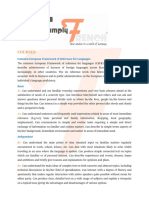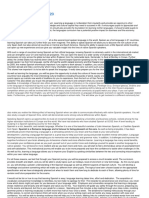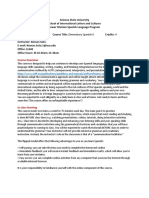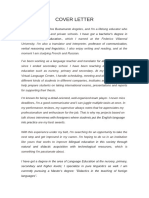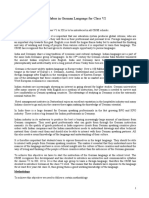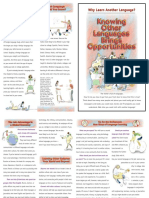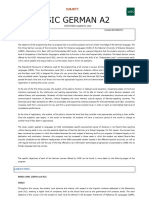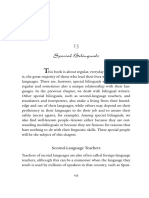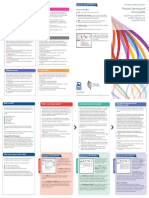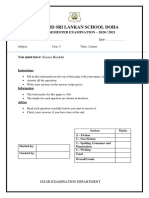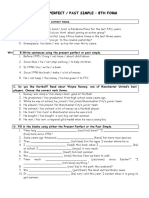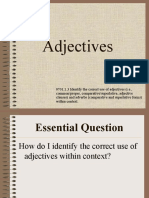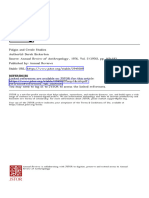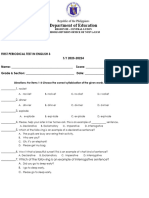0 ratings0% found this document useful (0 votes)
121 viewsCommon European Framework of Reference For Languages: (CEFR) Council of Europe
Common European Framework of Reference For Languages: (CEFR) Council of Europe
Uploaded by
rafaelmariasanchezSpanish is the fourth most commonly spoken language globally and is the official language of 20 countries. The DELE Diplomas are official Spanish proficiency certificates awarded by the Spanish Ministry of Education. There are six DELE levels that correspond to the Common European Framework of Reference for Languages, from A1 for basic proficiency to C2 for mastery. Over 45,000 candidates take the DELE exams each year in over 100 countries.
Copyright:
© All Rights Reserved
Available Formats
Download as DOCX, PDF, TXT or read online from Scribd
Common European Framework of Reference For Languages: (CEFR) Council of Europe
Common European Framework of Reference For Languages: (CEFR) Council of Europe
Uploaded by
rafaelmariasanchez0 ratings0% found this document useful (0 votes)
121 views3 pagesSpanish is the fourth most commonly spoken language globally and is the official language of 20 countries. The DELE Diplomas are official Spanish proficiency certificates awarded by the Spanish Ministry of Education. There are six DELE levels that correspond to the Common European Framework of Reference for Languages, from A1 for basic proficiency to C2 for mastery. Over 45,000 candidates take the DELE exams each year in over 100 countries.
Original Description:
dele
Original Title
Dele
Copyright
© © All Rights Reserved
Available Formats
DOCX, PDF, TXT or read online from Scribd
Share this document
Did you find this document useful?
Is this content inappropriate?
Spanish is the fourth most commonly spoken language globally and is the official language of 20 countries. The DELE Diplomas are official Spanish proficiency certificates awarded by the Spanish Ministry of Education. There are six DELE levels that correspond to the Common European Framework of Reference for Languages, from A1 for basic proficiency to C2 for mastery. Over 45,000 candidates take the DELE exams each year in over 100 countries.
Copyright:
© All Rights Reserved
Available Formats
Download as DOCX, PDF, TXT or read online from Scribd
Download as docx, pdf, or txt
0 ratings0% found this document useful (0 votes)
121 views3 pagesCommon European Framework of Reference For Languages: (CEFR) Council of Europe
Common European Framework of Reference For Languages: (CEFR) Council of Europe
Uploaded by
rafaelmariasanchezSpanish is the fourth most commonly spoken language globally and is the official language of 20 countries. The DELE Diplomas are official Spanish proficiency certificates awarded by the Spanish Ministry of Education. There are six DELE levels that correspond to the Common European Framework of Reference for Languages, from A1 for basic proficiency to C2 for mastery. Over 45,000 candidates take the DELE exams each year in over 100 countries.
Copyright:
© All Rights Reserved
Available Formats
Download as DOCX, PDF, TXT or read online from Scribd
Download as docx, pdf, or txt
You are on page 1of 3
Dele
Today Spanish is the worlds fourth most commonly spoken
language, after Chinese, English and Hindi. Spanish is the official
language of around twenty countries, spoken in more than 40, and
the mother tongue of over 400 million people. Spanish is at the
moment the second language of international communication, and
is being increasingly used in economic, political and cultural
relations.
The number of those studying Spanish throughout the world is
growing every year, and getting ready for the Diplomas of Spanish
as a Foreign Language (DELE), is definitely one of the best ways to
start working with Spanish and Latin American companies and
institutions.
The Diplomas of Spanish as a Foreign Language (DELE) are official
qualifications, which prove your level of proficiency in the Spanish
language and which are awarded by the Spanish Ministry of
Education and Science.
The DELE Diplomas are internationally recognized, and enjoy great
prestige not only among public and private educational institutions
and authorities, but also in the business world and chambers of
commerce. They are ideal for furthering your career and access to
education, both in Spain and in other Latin American countries.
The DELE examinations have been designed following the guidelines
of the Common European Framework of Reference for Languages
(CEFR) of the Council of Europe, which ensures a practical way of
establishing a standard, international and objective measurement of
the level that should be reached at each teaching stage, and in
evaluating results.
There are six levels (A1, A2, B1, B2, C1 and C2), and therefore the
courses are organized in six levels, depending on the degree of
difficulty and according to the students ability to communicate in
the language on completion of each level.
The examinations include Reading Comprehension, Written
Expression, Oral Comprehension, Grammar and Vocabulary and
Verbal Expression.
In Level A1, students will be able to express themselves simply in
basic and predictable everyday life situations.
In Level A2, students will be able to express themselves adequately
in basic social conventions and communicate satisfactorily in
everyday life situations.
In Level B1, students will be able to express themselves reasonably
accurately and with a degree of flexibility in familiar but more
complex everyday life situations.
In Level B2, students will be able to communicate fluently and with
sufficient accuracy, using an appropriate register of formality, to
express their ideas well, using language suitable for the situation.
In Level C1, students will be able to express themselves fluently and
spontaneously, using the register necessary for the context of the
conversation and the intentions of the speaker.
And finally in Level C2, students will be able to express themselves
in all types of situations, including discussion on abstract and
complex specialised themes.
DELE Diploma in Spanish
Framework of
Reference
Level
Diploma in Spanish Level A1
A1
Breakthrou
Diploma in Spanish Level A2
A2
Waystage
Diploma in Spanish Level B1
B1
Threshold
Diploma in Spanish Level B2
B2
Vantage
Diploma in Spanish Level C1
C1
Effective O
Proficiency
Diploma in Spanish Level C2
C2
Mastery
Every year, more than 45,000 candidates sit the examinations for
this Diploma. Examinations are held three times a year in May,
August and November, in 500 examination centres based in over
100 countries worldwide.
The University of Salamanca collaborates in designing exam papers
and in grading the tests with Instituto Cervantes, a public institution
from the Spanish Government that was founded in 1991 to promote
the development of Spanish and Latin American language and
culture throughout the world.
At the Diplomas website (http://diplomas.cervantes.es/en) you can
find all the information you need about DELE.
You might also like
- Spanish for Beginners: Learn the Basics of Spanish in 7 DaysFrom EverandSpanish for Beginners: Learn the Basics of Spanish in 7 DaysRating: 4 out of 5 stars4/5 (12)
- Evening Language Programme 2020/2021: Course Title: Spanish DELE Exam Preparation B1 - OnlineDocument2 pagesEvening Language Programme 2020/2021: Course Title: Spanish DELE Exam Preparation B1 - OnlineTomas GoodgameNo ratings yet
- Learn Spanish : How To Learn Spanish Fast In Just 168 Hours (7 Days)From EverandLearn Spanish : How To Learn Spanish Fast In Just 168 Hours (7 Days)Rating: 3 out of 5 stars3/5 (8)
- Campus DifusionDocument1 pageCampus Difusionrafaelmariasanchez0% (1)
- Mastering Spanish: Your Guide to Learning the Language: The Language CollectionFrom EverandMastering Spanish: Your Guide to Learning the Language: The Language CollectionRating: 5 out of 5 stars5/5 (1)
- LLS Spanish BrochureDocument10 pagesLLS Spanish Brochurelearn languagesNo ratings yet
- The Sanchez MethodDocument20 pagesThe Sanchez MethodrafaelmariasanchezNo ratings yet
- Learn French With The Best French Language Institute in Delhi.Document8 pagesLearn French With The Best French Language Institute in Delhi.Ramanpreet Kaur SidhuNo ratings yet
- Levels in French Language CoursesDocument8 pagesLevels in French Language CoursesRamanpreet Kaur SidhuNo ratings yet
- Common European Framework of Reference For Languages1Document4 pagesCommon European Framework of Reference For Languages1ClauDit A. MontañoNo ratings yet
- Simply FRENCH CoursesDocument6 pagesSimply FRENCH CoursesR.Pearlsis SophiNo ratings yet
- Top French Language Institute in Delhi NCR 2022Document29 pagesTop French Language Institute in Delhi NCR 2022Ramanpreet Kaur SidhuNo ratings yet
- Spanish Short Stories for Beginners: Learn Spanish by Reading and Improve Your VocabularyFrom EverandSpanish Short Stories for Beginners: Learn Spanish by Reading and Improve Your VocabularyRating: 5 out of 5 stars5/5 (1)
- GCSESpanishDocument12 pagesGCSESpanishShruti BansalNo ratings yet
- 2016 2017 DisclosureDocument7 pages2016 2017 Disclosureapi-54437087No ratings yet
- Learn Spanish 18 Day Challenge: For Intermediate Includes Conversation, Exercises, Grammar Rules, And Dialogues: Learn Spanish, #5From EverandLearn Spanish 18 Day Challenge: For Intermediate Includes Conversation, Exercises, Grammar Rules, And Dialogues: Learn Spanish, #5No ratings yet
- The Romanian Education SystemDocument32 pagesThe Romanian Education SystemFlorentina SpinareNo ratings yet
- The Ultimate Learning Spanish Blueprint - 10 Essential StepsFrom EverandThe Ultimate Learning Spanish Blueprint - 10 Essential StepsRating: 5 out of 5 stars5/5 (1)
- Learn Spanish : How To Learn Spanish Fast In Just 168 Hours (7 Days): The Blokehead Success SeriesFrom EverandLearn Spanish : How To Learn Spanish Fast In Just 168 Hours (7 Days): The Blokehead Success SeriesRating: 3.5 out of 5 stars3.5/5 (7)
- Living & Learning International Spanish Course Registration Form For Ecuador: Spring 2015Document1 pageLiving & Learning International Spanish Course Registration Form For Ecuador: Spring 2015Bryan ColeNo ratings yet
- Common European Framework of ReferentDocument4 pagesCommon European Framework of ReferentAmerica VelasquezNo ratings yet
- How You Say Resume in SpanishDocument7 pagesHow You Say Resume in Spanishydzkmgajd100% (2)
- Malla Curricular Inglés - 2023Document58 pagesMalla Curricular Inglés - 2023Leandro HerreraNo ratings yet
- Victoria - Is Prelim ExamDocument2 pagesVictoria - Is Prelim ExamTinoy Maria Mae O.No ratings yet
- Tprs-Spanish 1 and 2 - StandardsDocument5 pagesTprs-Spanish 1 and 2 - Standardsapi-227795658100% (1)
- Instant Access to (eBook PDF) Mas alla de las palabras: Intermediate Spanish, Third Edition 3rd Edition ebook Full ChaptersDocument55 pagesInstant Access to (eBook PDF) Mas alla de las palabras: Intermediate Spanish, Third Edition 3rd Edition ebook Full Chaptersadisaamd100% (1)
- Safari - 2 Mar 2018 at 11:07 PMDocument1 pageSafari - 2 Mar 2018 at 11:07 PMAyoub BacharNo ratings yet
- Spa 102 SyllabusDocument15 pagesSpa 102 Syllabusapi-434288754No ratings yet
- The Role of French in International DiplomacyDocument2 pagesThe Role of French in International DiplomacyGurnoor KaurNo ratings yet
- Report 1 - Foreign Languages Learned in My CountryDocument1 pageReport 1 - Foreign Languages Learned in My Countryjorcaro2007No ratings yet
- Plan Your Careers Talk) : (Foreign LanguagesDocument5 pagesPlan Your Careers Talk) : (Foreign LanguagesJesus David Alvrez TamaraNo ratings yet
- Conversational French Quick and Easy: PART II: The Most Innovative and Revolutionary Technique to Learn the French Language.From EverandConversational French Quick and Easy: PART II: The Most Innovative and Revolutionary Technique to Learn the French Language.No ratings yet
- Courses in Foreign LangugagesDocument19 pagesCourses in Foreign LangugagesShubhamTiwariNo ratings yet
- Transparent Language K-12 French CurriculumDocument6 pagesTransparent Language K-12 French CurriculumAna Paola Mosqueira SantillánNo ratings yet
- NEFportfolio Preint PDFDocument32 pagesNEFportfolio Preint PDFpcdmisNo ratings yet
- Levet of ProficiencyDocument20 pagesLevet of ProficiencyJarito Linno MorilloNo ratings yet
- Auditorium 2. Projector 3. Backup Laptop 4. Sound System (Which Can Be Connected With The Laptop) 5. White Board, Board Marker, Board EraserDocument4 pagesAuditorium 2. Projector 3. Backup Laptop 4. Sound System (Which Can Be Connected With The Laptop) 5. White Board, Board Marker, Board EraserMarkWeberNo ratings yet
- Amazon Language GuideDocument2 pagesAmazon Language GuideredultraNo ratings yet
- Template - CP ReflectionDocument3 pagesTemplate - CP ReflectionNallapati AbhiNo ratings yet
- English Cover LetterDocument4 pagesEnglish Cover Letterjose.bustamante.angelesNo ratings yet
- Spanish Level 6: Modern Language Centre Evening Language Classes Course DescriptionDocument3 pagesSpanish Level 6: Modern Language Centre Evening Language Classes Course DescriptionrafaelmariasanchezNo ratings yet
- Language NotesDocument3 pagesLanguage Notesandres47salazarNo ratings yet
- First Language vs Second Language, Native Language vs. Mother Tongue vs. Foreign LanguageDocument2 pagesFirst Language vs Second Language, Native Language vs. Mother Tongue vs. Foreign Languageg07haeunNo ratings yet
- 5-12 Spanish Instructional Alignment: June 2nd, 2016Document11 pages5-12 Spanish Instructional Alignment: June 2nd, 2016api-321244529No ratings yet
- Spanish Grammar 2 (Tenses): Start learning European Spanish from the ground up with these 5 books., #4From EverandSpanish Grammar 2 (Tenses): Start learning European Spanish from the ground up with these 5 books., #4No ratings yet
- Class VI Syllabus in German Language 2008Document7 pagesClass VI Syllabus in German Language 2008SamyamoyNo ratings yet
- ESL and EFL Language Standards.Document13 pagesESL and EFL Language Standards.maria alejandraNo ratings yet
- Spanish: Learn Spanish for Beginners In A Fun and Easy Way: Including Pronunciation, Spanish Grammar, Reading, and Writing, Plus Short Stories By: University of LinguisticsFrom EverandSpanish: Learn Spanish for Beginners In A Fun and Easy Way: Including Pronunciation, Spanish Grammar, Reading, and Writing, Plus Short Stories By: University of LinguisticsNo ratings yet
- Mastering Spanish: A Comprehensive Guide to Fluent CommunicationFrom EverandMastering Spanish: A Comprehensive Guide to Fluent CommunicationNo ratings yet
- Knowing Other Languages Brings OpportunitiesDocument2 pagesKnowing Other Languages Brings Opportunitiesapi-338662559No ratings yet
- Learn Spanish Writing Workbook for Adults and DELE Exam: Spanish Language LearningFrom EverandLearn Spanish Writing Workbook for Adults and DELE Exam: Spanish Language LearningNo ratings yet
- Short-Term Cert Course French 02july2024 17-10-49-78Document2 pagesShort-Term Cert Course French 02july2024 17-10-49-78yy1794895No ratings yet
- German Uned Guide A2 PDFDocument10 pagesGerman Uned Guide A2 PDFScribdTranslationsNo ratings yet
- Bilingual ch13Document16 pagesBilingual ch13kerosene002No ratings yet
- French Immersion French Immersion: A Parent'S Guide ToDocument15 pagesFrench Immersion French Immersion: A Parent'S Guide TomariannegrogersNo ratings yet
- French Coursework SchoolDocument8 pagesFrench Coursework Schoolafiwfrvtf67% (3)
- Conversational Dutch: A Comprehensive Guide to Speaking Dutch FluentlyFrom EverandConversational Dutch: A Comprehensive Guide to Speaking Dutch FluentlyNo ratings yet
- EssayDocument1 pageEssayOlga BoaruNo ratings yet
- 28100Document3 pages28100arjungudise19No ratings yet
- Spanish Courses LondonDocument9 pagesSpanish Courses LondonrafaelmariasanchezNo ratings yet
- Course Units 2016-2017: Project: Proposal Form (Stage 2)Document2 pagesCourse Units 2016-2017: Project: Proposal Form (Stage 2)rafaelmariasanchezNo ratings yet
- Social MediaDocument2 pagesSocial MediarafaelmariasanchezNo ratings yet
- Alliance Between Business and Science)Document1 pageAlliance Between Business and Science)rafaelmariasanchezNo ratings yet
- Beginners Arabic Study Pack BDocument40 pagesBeginners Arabic Study Pack BrafaelmariasanchezNo ratings yet
- CourseUnitsStudentHandbook PDFDocument76 pagesCourseUnitsStudentHandbook PDFrafaelmariasanchezNo ratings yet
- Spanish 5-6 Year PlanDocument1 pageSpanish 5-6 Year PlanrafaelmariasanchezNo ratings yet
- Spanish 11 Year PlanDocument1 pageSpanish 11 Year PlanrafaelmariasanchezNo ratings yet
- Please Send Your e-MAIL To: ThanksDocument1 pagePlease Send Your e-MAIL To: ThanksrafaelmariasanchezNo ratings yet
- ¡Listos! 2 Verde Módulo 1 Nos Presentamos: Unidad 1 pp.6-7 Son Muy FamososDocument7 pages¡Listos! 2 Verde Módulo 1 Nos Presentamos: Unidad 1 pp.6-7 Son Muy FamososrafaelmariasanchezNo ratings yet
- Latin 7 Year PlanDocument1 pageLatin 7 Year PlanrafaelmariasanchezNo ratings yet
- Latin 5-6 Year PlanDocument1 pageLatin 5-6 Year PlanrafaelmariasanchezNo ratings yet
- School: Class: Module To Be Covered From: To: (Dates) ¡Listos! 3 Verde Módulo 7 de ComprasDocument6 pagesSchool: Class: Module To Be Covered From: To: (Dates) ¡Listos! 3 Verde Módulo 7 de ComprasrafaelmariasanchezNo ratings yet
- Listos1 Frameworked Modules1and2Document62 pagesListos1 Frameworked Modules1and2rafaelmariasanchez100% (1)
- Unidad 1 pp6-7 ¡Hola!: Tú vs. Usted/ustedesDocument8 pagesUnidad 1 pp6-7 ¡Hola!: Tú vs. Usted/ustedesrafaelmariasanchezNo ratings yet
- Course Plan: Ter M Learning Objectives Learning Activities Sketchbook/portfolio ProgressDocument7 pagesCourse Plan: Ter M Learning Objectives Learning Activities Sketchbook/portfolio ProgressrafaelmariasanchezNo ratings yet
- Gcse Spa Support 5226Document94 pagesGcse Spa Support 5226rafaelmariasanchezNo ratings yet
- The Six Areas of The PLTS Framework: Independent Enquirers Team WorkersDocument2 pagesThe Six Areas of The PLTS Framework: Independent Enquirers Team WorkersrafaelmariasanchezNo ratings yet
- Todos Podemos Colaborar GramaticaDocument3 pagesTodos Podemos Colaborar GramaticarafaelmariasanchezNo ratings yet
- Mark The JoggerDocument2 pagesMark The JoggerJUAN CAMILO MARTINEZ MUÑOZNo ratings yet
- Year 5 - English - Question Paper - Second Semester ExamDocument13 pagesYear 5 - English - Question Paper - Second Semester ExamlatheepanshaarukshaNo ratings yet
- Upper-Intermediate GW 06b-2Document2 pagesUpper-Intermediate GW 06b-2menekshistivenNo ratings yet
- JADWAL ROLE PLAY KaRu KEPERAWATAN KELOMPOK 9BDocument12 pagesJADWAL ROLE PLAY KaRu KEPERAWATAN KELOMPOK 9Bfatchurohman azis08No ratings yet
- Majorship English - Philippine Literature in EnglishDocument8 pagesMajorship English - Philippine Literature in Englishalvin n. vedarozagaNo ratings yet
- Present Perfect / Past Simple - 8Th FormDocument1 pagePresent Perfect / Past Simple - 8Th FormIvan Adhi NugrahaNo ratings yet
- SO+adjetive/adverb: SUCH+ (A/n) + (Adjetive) +noun SUCH+ (A/n) + (Adjetive) +nounDocument36 pagesSO+adjetive/adverb: SUCH+ (A/n) + (Adjetive) +noun SUCH+ (A/n) + (Adjetive) +nounSamuelYoga'sNo ratings yet
- The Global and Local Impact of BTS, The K-Pop Group That Rocked The WorldDocument6 pagesThe Global and Local Impact of BTS, The K-Pop Group That Rocked The WorldIna KupangNo ratings yet
- Review Les Adjectifs PossessifsDocument2 pagesReview Les Adjectifs PossessifsChungusNo ratings yet
- 1 Bac ExamDocument5 pages1 Bac ExamEL EBRAHIMI FatimaNo ratings yet
- Keeping A Conversation GoingDocument4 pagesKeeping A Conversation Goingdolores salomonNo ratings yet
- Bhramaramba Ashtakam PDFDocument6 pagesBhramaramba Ashtakam PDFsnkelkar16531No ratings yet
- Sasa To Sasa Ki Kapus Jasa - Marathi Balgeet For Kids - YouTubeDocument1 pageSasa To Sasa Ki Kapus Jasa - Marathi Balgeet For Kids - YouTubeAshwini AsabeNo ratings yet
- Y6 SPaG RevisionDocument8 pagesY6 SPaG RevisionHeshaniNo ratings yet
- The Essentials of Academic Writing For International StudentsDocument3 pagesThe Essentials of Academic Writing For International Studentsyeboahkelvin2004No ratings yet
- CPE English PracticeDocument9 pagesCPE English PracticealexcereportNo ratings yet
- Mynediad Gogledd Canllaw Gramadeg Grammar GuidelineDocument15 pagesMynediad Gogledd Canllaw Gramadeg Grammar GuidelineMartínez InstitutoNo ratings yet
- Putting On An ActDocument23 pagesPutting On An Acttutorial 001No ratings yet
- Onomatopoeia Sound Word BoxDocument2 pagesOnomatopoeia Sound Word BoxEdgar SenevirathnaNo ratings yet
- English Language WorksheetsDocument54 pagesEnglish Language WorksheetsAlly Hassan AliNo ratings yet
- Adjectives PowerPointDocument28 pagesAdjectives PowerPointInsaf AliNo ratings yet
- 2023 All Papers English MCQs Part-2Document113 pages2023 All Papers English MCQs Part-2Wassay KhanNo ratings yet
- A Modern Approach For Sign Language Interpretation Using CNNDocument15 pagesA Modern Approach For Sign Language Interpretation Using CNNPias PaulNo ratings yet
- Australian Culture and Culture ShockDocument3 pagesAustralian Culture and Culture ShockarioliNo ratings yet
- Quarter 4 Week 23Document46 pagesQuarter 4 Week 23Kherulph OraisNo ratings yet
- A. Structure The Structure Questions:: Structure: Subject - Verb & Object of Preposition Reading: MainDocument65 pagesA. Structure The Structure Questions:: Structure: Subject - Verb & Object of Preposition Reading: MainAnita Hidayat PutriNo ratings yet
- KJ Unit 1Document14 pagesKJ Unit 1fresti dwi100% (1)
- Pidgin Creole StudiesDocument26 pagesPidgin Creole Studiesanas.serrari-etuNo ratings yet
- Morphology: Pham Van Dong University Falcuty of Foreign LanguagesDocument33 pagesMorphology: Pham Van Dong University Falcuty of Foreign LanguagesBảo UyênNo ratings yet
- English 3 - First Quarter ExamDocument10 pagesEnglish 3 - First Quarter ExamJulius SagcalNo ratings yet










